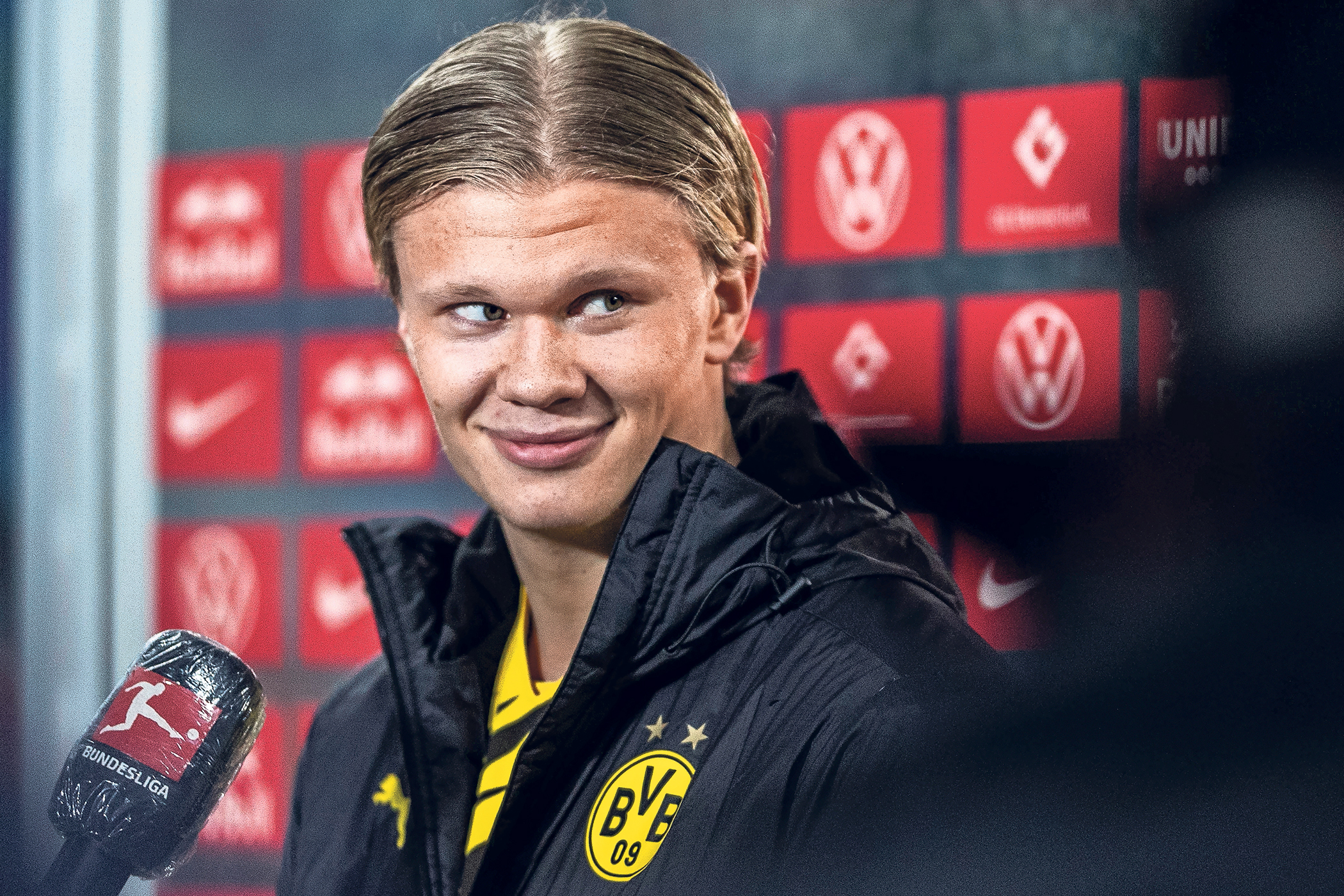The first and only time I have met Erling Haaland – met in the sense that we shook hands and sat down, rather than met in the sense that I jabbed an iPhone in his general direction as he hurried, fresh from the shower, past the assembled media after a game – was in the middle of what we might think of as his gnomic period.
Haaland was still only 19 at that point in February 2020, but he was already very much a star in the making. For the most part that could of course be attributed to the improbable volume of goals he had scored, first for RB Salzburg and then – having moved a month before – for Borussia Dortmund, but Haaland had also shown an unexpected gift for creating compelling, if slightly awkward, content.
His television interviews, in particular, occasionally took the form of comic masterpieces. He answered in short sentences. Very short. He was extremely literal. He never elaborated. He told one journalist their questions were “very bad”. He gave others a withering side-eye. He tended to stare directly into the lens. “Woah,” he said, when one camera came too near. “We’re close now, huh?” He seemed to invite the cringe.
Our interview was a little like that, in parts. We sat in a modular building at Dortmund’s training ground, the morning after Haaland had scored twice against Paris Saint-Germain in the Champions League. He leaned back in a swivel chair and swung his legs onto the table in front of him.
Listening back – always keep your tapes, kids – there is too much of my voice, not enough of his. The questions tend to be longer than the answers. If one did not interest him, the reply often extends to somewhere between one word and six. That was, he would later say, a deliberate policy. “You ask stupid questions, you’ll get a stupid answer back,” he told Time Magazine this year.
But not every response was terse. He talked a lot about the weight of his father’s name (thankfully; that was the main thrust of the interview.) He cracked a joke. I asked him at one point what it felt like to be a teenage sensation. “More like a Zen-sation,” he said. And once the tape was off, when we got on to the subject of his early childhood in Yorkshire, he changed markedly. This is no surprise. Everyone likes talking about Leeds.
It left me with the impression that Haaland was not impolite – as that noted arbiter of good manners, Piers Morgan, at one point suggested – but that he was possessed of both a fairly predictable teenage defiance and more unusually a sense of humour that leaned just a little toward the offbeat, the crooked, maybe even the meta. He was, deep down, amused by the absurdity of being interviewed. It was funny to point it out.
That was not how it was taken more broadly, of course. Those stilted, difficult appearances fitted perfectly with the idea – expressed from the earliest days of his career outside Norway – that Haaland was a cyborg or a robot or some other sort of mechanoid, that he had been grown in a laboratory somewhere deep beneath a fjord, a scientist’s crazy attempt to create the perfect goalscorer.
All of those parallels are intended as compliments, of course. He is so complete that he does seem a bit like a triumph of intelligent design: fast, strong, tall, ruthlessly efficient in front of goal. His output, too, has been so prodigious that it feels in some way industrial. There is no point rehashing all of the numbers and the records: three will do. He has scored more goals in his first 100 Premier League games than anyone else. He has scored 50 goals in the Champions League faster than anyone else. He currently has 27 goals in 17 games for club and country this season.
Haaland has, at times, indulged the metaphors – he celebrated a goal against Bournemouth last week by doing the robot dance – but it would also appear that he is not entirely delighted by how easily, how readily he is reduced to numbers.
Newsletters
Choose the newsletters you want to receive
View more
For information about how The Observer protects your data, read our Privacy Policy
He is not the only one: the rise of data in the coverage of football, so useful in feeling like you are winning arguments online with cold, hard facts, has created a tendency for every player to be distilled to nothing but their goals and assists and their pass-completion metrics, as though what was once a sport is now best understood as an algorithm.
He is, though, probably the most extreme case. It is rooted, again, in admiration: Haaland’s numbers are cited so often because as a rule they are the best numbers. But their prominence has served to make him somehow unknowable, one of the world’s most famous players and yet also something of an enigma.
His decision, last month, to start his own YouTube channel is designed to counteract that. The idea that YouTube is somehow more real, more authentic than traditional television is bunk, of course: if anything, it is the most curated, controlled, mediated format available, a place in which people can present themselves solely as they want to be presented.
And yet Haaland’s channel, with its more than 900,000 subscribers after only two videos, nevertheless serves to fill out his character, to soften his edges. It has been created in collaboration with his agency Tatica to do just that. Haaland has long been an understated star of much of Manchester City’s social content, but the player and his agent, Rafaela Pimenta, acknowledged that he remained inscrutable outside those channels.
As always with these things, it is not in the set pieces – the day-in-the-life film in which he showcases not only his dedication to his work but his deftness in the kitchen – or even in the sorts of details that tend to fascinate newspapers, like the fact that he drinks raw milk or has maple syrup in his coffee. No, the best bits are in the background: when he is sitting, noodling over breakfast with his partner, Isabel, only to be left speechless when she casually points out that he is “not the best dribbler” in the game.
Or when Haaland goes out to buy nappies, dressed as Heath Ledger’s Joker, with just £4 in his car’s glove compartment. He does not think this will be enough to buy nappies. But he is delighted when he realises it may well get him some chocolate, and he is equally gleeful when he is recognised in a local corner shop.
“I didn’t think you’d be here, dressed like that on a Thursday night,” says a girl in the queue. There is a reason for that. Most footballers, most people as impossibly famous and instantly familiar as him, would not find themselves in that situation. But then Haaland has always been just a little bit different.
Photograph by Boris Streubel/Bundesliga Collection via Getty Images



